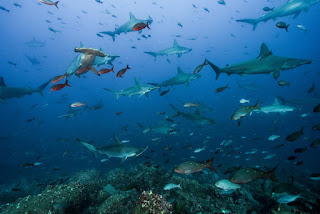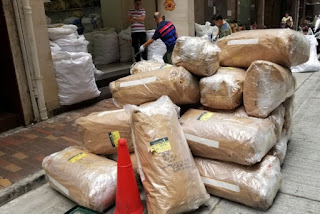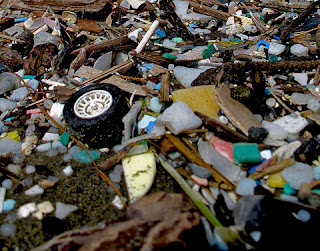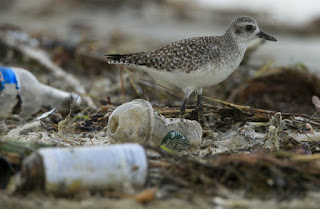1. Scientists Prove Sharks Travel Between Galapagos and Cocos Island
 Scientists have long wondered if sharks that are seen near Cocos Island off of Costa Rica also travel south to the Galapagos Islands. They have found their answer with the discovery of a a 500-mile-long “shark highway” between the two islands. Hammerheads, silky, and thresher sharks were videotaped along with 13 other species of sharks, fish, dolphins, and sea turtles. The scientists used baited video cameras known as BRUVS. Although fish are protected at Cocos Island and the Galapagos, in between they are fair game to fishermen. The discovery of this shark highway is an important step toward protecting species at risk.
Scientists have long wondered if sharks that are seen near Cocos Island off of Costa Rica also travel south to the Galapagos Islands. They have found their answer with the discovery of a a 500-mile-long “shark highway” between the two islands. Hammerheads, silky, and thresher sharks were videotaped along with 13 other species of sharks, fish, dolphins, and sea turtles. The scientists used baited video cameras known as BRUVS. Although fish are protected at Cocos Island and the Galapagos, in between they are fair game to fishermen. The discovery of this shark highway is an important step toward protecting species at risk.
-----------------------------------------------
2. Whale Shark Fins Found in Illegal Shipment to Hong Kong
 Whale shark fins, as well as those from other endangered sharks, were found in an illegal shipment aboard Singapore Airlines. Singapore Airlines bans shark fin cargo, but the fins were labeled “dry seafood.” Although Hong Kong permits the import of shark fins, those shark species listed under the U.N. Convention on International Trade in Endangered Species (CITES) Appendix II must be accompanied by a permit.
Whale shark fins, as well as those from other endangered sharks, were found in an illegal shipment aboard Singapore Airlines. Singapore Airlines bans shark fin cargo, but the fins were labeled “dry seafood.” Although Hong Kong permits the import of shark fins, those shark species listed under the U.N. Convention on International Trade in Endangered Species (CITES) Appendix II must be accompanied by a permit.
-----------------------------------------------
3. Europe Proposes Ban of Single-Use Plastics
 The European Commission has proposed banning 10 of the most common single-use plastics, as well as abandoned fishing gear. About 70 percent of the marine litter found along the EU’s coastlines is plastic. "Plastic waste is undeniably a big issue, and Europeans need to act together to tackle this problem, because plastic waste ends up in our air, our soil, our oceans, and in our food," said EU Commission Vice President Frans Timmermans. The rules vary for products with an alternative (like straws and plastic utensils) and those without a viable alternative (like cigarette butts and wet wipes). Producers of plastic fishing gear would be required to pay the cost of cleanup. “The European Commission has also set a target for its 28 member states to collect 90 percent of single-use plastic drink bottles by 2025.”
The European Commission has proposed banning 10 of the most common single-use plastics, as well as abandoned fishing gear. About 70 percent of the marine litter found along the EU’s coastlines is plastic. "Plastic waste is undeniably a big issue, and Europeans need to act together to tackle this problem, because plastic waste ends up in our air, our soil, our oceans, and in our food," said EU Commission Vice President Frans Timmermans. The rules vary for products with an alternative (like straws and plastic utensils) and those without a viable alternative (like cigarette butts and wet wipes). Producers of plastic fishing gear would be required to pay the cost of cleanup. “The European Commission has also set a target for its 28 member states to collect 90 percent of single-use plastic drink bottles by 2025.”
-----------------------------------------------
4. Japan’s Whale Slaughter Included 122 Pregnant Minke Females

In the “name of research,” Japan has killed 333 minke whales, including 122 pregnant females. “Japan allows the whale meat to be sold as a food product, removing even more credibility from its claims about scientific research.” They claim they can only age a whale by killing it and removing its internal ear plugs, but other scientists disagree. “According to the Sydney Morning Herald, Japan intends to kill around 4,000 whales over the next 12 years, and eventually resume commercial whaling.”
-----------------------------------------------
The California State Legislature is considering bills regarding plastic pollutants including straws, bottle caps, and polyester. An assembly bill would “bar sit-down restaurants from providing plastic straws unless a customer requests one.” A proposed law would “would prohibit retailers from selling single-use plastic bottles with caps that do not remain tethered to the container after opening.” Another assembly bill would require “all new clothing made with more than 50% synthetic material have a label that warns of microfiber shedding during washing.” California often leads the way in environmental bills; its microbead ban from beauty products led to a national ban. It is estimated that there will be more plastic than fish in the oceans by 2050.
Read more...
-----------------------------------------------

6. New Jersey Leads the Resistance Against Trump’s Offshore Drilling Plan

Despite the promises of jobs and wealth, the mayor of Asbury Park, New Jersey, John Moor, is fiercely opposed to Trump’s proposed offshore drilling plan. “I don’t think the risk is worth all the money in the world,” he said. “Across the Atlantic Coast strip, mayors in nearly every city teamed with council members, conservationists, business leaders and residents to craft resolutions that denounced the proposal to widen federal offshore leasing to 90 percent of the outer continental shelf, an effort that began just days after Interior Secretary Ryan Zinke announced the plan in January.” The governor of New Jersey, Phil Murphy, signed a bill passed by the state legislature that “prohibits oil exploration in state waters, which extend three miles from shore.”
-----------------------------------------------
7. New Bill Could Ban Plastic Straws in All NYC Bars and Restaurants
The straw that stirs New York City’s drink will soon be made of paper, if a group of City Council members has anything to say about it. On Wednesday, Councilman Rafael Espinal announced that he is introducing a new bill to the chamber that would ban all food and drink establishments in the city from offering customers any straw or stirrer made of plastic or any other nonbiodegradable material.
Read more...
8. New Study - Whale Sharks Still Endangered
 The IUCN Red List assessment found that growing human pressures were contributing to the threats putting whale sharks at an increasing risk of extinction, along with some few other newly assessed animals. “It is alarming to see such emblematic species slide towards extinction,” said Jane Smart, director of IUCN’s Global Species Programme, in a press release. The new assessments emphasise how urgent it is for the conservation community to act strategically to protect the diversity of life, she said in the release. Their numbers have been halved over the last 75 years, according to the assessment, as the giant continued to be both fished and accidentally killed by ship propellers
The IUCN Red List assessment found that growing human pressures were contributing to the threats putting whale sharks at an increasing risk of extinction, along with some few other newly assessed animals. “It is alarming to see such emblematic species slide towards extinction,” said Jane Smart, director of IUCN’s Global Species Programme, in a press release. The new assessments emphasise how urgent it is for the conservation community to act strategically to protect the diversity of life, she said in the release. Their numbers have been halved over the last 75 years, according to the assessment, as the giant continued to be both fished and accidentally killed by ship propellers
-----------------------------------------------
8. New Study - Whale Sharks Still Endangered
 The IUCN Red List assessment found that growing human pressures were contributing to the threats putting whale sharks at an increasing risk of extinction, along with some few other newly assessed animals. “It is alarming to see such emblematic species slide towards extinction,” said Jane Smart, director of IUCN’s Global Species Programme, in a press release. The new assessments emphasise how urgent it is for the conservation community to act strategically to protect the diversity of life, she said in the release. Their numbers have been halved over the last 75 years, according to the assessment, as the giant continued to be both fished and accidentally killed by ship propellers
The IUCN Red List assessment found that growing human pressures were contributing to the threats putting whale sharks at an increasing risk of extinction, along with some few other newly assessed animals. “It is alarming to see such emblematic species slide towards extinction,” said Jane Smart, director of IUCN’s Global Species Programme, in a press release. The new assessments emphasise how urgent it is for the conservation community to act strategically to protect the diversity of life, she said in the release. Their numbers have been halved over the last 75 years, according to the assessment, as the giant continued to be both fished and accidentally killed by ship propellers
Read more...
9. Greenland Swims Upstream - Signs Salmon Agreement with Far-reaching, International Ramifications
-----------------------------------------------
9. Greenland Swims Upstream - Signs Salmon Agreement with Far-reaching, International Ramifications
The Atlantic Salmon Federation (ASF) and the North Atlantic Salmon Fund (NASF) have signed new agreements with commercial fishermen in Greenland and the Faroe Islands that will protect thousands of adult wild Atlantic salmon from commercial nets and longlines, allowing them to return to North American and European rivers.
-----------------------------------------------
10. United Nations / World Environment Day Inspired - Campaign Takes Off
Be sure to "LIKE" http://facebook.com/SeaSave to ensure our "Week in Review" is delivered to your newsfeed every Friday.
Sea Save Foundation is committed to raising awareness of marine conservation. The Week in Review is a team effort produced by the Sea Save staff to provide a weekly summary of the latest in marine research, policy, and news.



